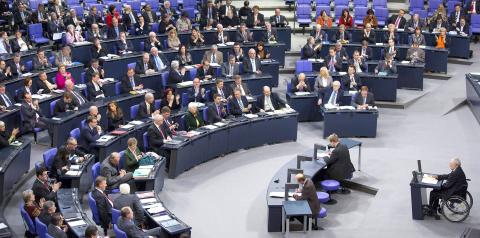A powerful international bank lobby warned on Thursday that the outcome of Greece’s looming debt buyback program remains uncertain and warned that it must be “purely voluntary.”
The Institute of International Finance’s (IIF) Market Monitoring Group welcomed a third EU-IMF aid program agreed on Tuesday as important to cutting Greece’s debt and helping it avoid a default.
But the IIF said that “uncertainty remains” over the plan, especially regarding Athens’s planned buyback of debt, a linchpin of the deal that will reduce its interest burden and free up funds from its lenders.

Photo: EPA
“A voluntary debt buyback is assumed by the euro area to be instrumental to reducing Greece’s debt-to-GDP ratio, allowing program disbursement,” it said in a statement following meetings in New York.
“However, it is critical that any buyback be conducted on a purely voluntary basis,” it said.
The IIF, which led the talks between private-sector creditors and Greece, which resulted in banks taking a deep write-off earlier this year, made clear its members did not want to be forced into taking more losses on Greek bonds.
It hailed important parts of Tuesday’s deal, including the reduction in bilateral lending rates, the extension of maturity on rescue loans, and the turning over of European Central Bank (ECB) and other eurozone central banks’ profits on their Greek bonds to the Greek government.
The debt buyback is a cornerstone of the agreement reached by the IMF, the European Commission and the ECB, which pledged the release over the next four months of 43.7 billion euros (US$56.7 billion) in new rescue aid to Greece.
IMF spokesman Gerry Rice said on Thursday that the fund’s support of the new program is contingent on the success of the buyback program.
Athens said it expected to launch the buyback next week and complete it by Dec.13, though if the operation fails, Athens said it had an alternative plan.
But the IIF raised doubts over whether the buyback would achieve its goals, and said the focus should be on restoring growth to the depressed Greek economy.
“At present, the outcome of the buyback — and the final decision on the next disbursement — remains uncertain,” the IIF said.
“In any event it is increasingly clear that meaningful progress toward debt sustainability can only be achieved with a return to economic growth,” it added.
The group criticized lenders’ policy approach toward Greece and the weak economies of the eurozone.
“The emphasis on aggressive short-term fiscal contraction in the euro area does not fully address the fundamental challenge,” the IIF said.
In Greece’s case, the group argued for more emphasis on privatization and tax reform, an acceleration of eurozone investment funds, and more concessions by official creditors such as interest rate cuts, including from the IMF.
Such moves are “urgently needed to restore economic growth,” it said.
Ratings firm Moody’s echoed the IIF’s concerns on Thursday, saying it was uncertain whether there would be sufficient private-sector participation “to contribute to a meaningful debt reduction.”

WEAKER ACTIVITY: The sharpest deterioration was seen in the electronics and optical components sector, with the production index falling 13.2 points to 44.5 Taiwan’s manufacturing sector last month contracted for a second consecutive month, with the purchasing managers’ index (PMI) slipping to 48, reflecting ongoing caution over trade uncertainties, the Chung-Hua Institution for Economic Research (CIER, 中華經濟研究院) said yesterday. The decline reflects growing caution among companies amid uncertainty surrounding US tariffs, semiconductor duties and automotive import levies, and it is also likely linked to fading front-loading activity, CIER president Lien Hsien-ming (連賢明) said. “Some clients have started shifting orders to Southeast Asian countries where tariff regimes are already clear,” Lien told a news conference. Firms across the supply chain are also lowering stock levels to mitigate

Six Taiwanese companies, including contract chipmaker Taiwan Semiconductor Manufacturing Co (TSMC, 台積電), made the 2025 Fortune Global 500 list of the world’s largest firms by revenue. In a report published by New York-based Fortune magazine on Tuesday, Hon Hai Precision Industry Co (鴻海精密), also known as Foxconn Technology Group (富士康科技集團), ranked highest among Taiwanese firms, placing 28th with revenue of US$213.69 billion. Up 60 spots from last year, TSMC rose to No. 126 with US$90.16 billion in revenue, followed by Quanta Computer Inc (廣達) at 348th, Pegatron Corp (和碩) at 461st, CPC Corp, Taiwan (台灣中油) at 494th and Wistron Corp (緯創) at

NEGOTIATIONS: Semiconductors play an outsized role in Taiwan’s industrial and economic development and are a major driver of the Taiwan-US trade imbalance With US President Donald Trump threatening to impose tariffs on semiconductors, Taiwan is expected to face a significant challenge, as information and communications technology (ICT) products account for more than 70 percent of its exports to the US, Chung-Hua Institution for Economic Research (CIER, 中華經濟研究院) president Lien Hsien-ming (連賢明) said on Friday. Compared with other countries, semiconductors play a disproportionately large role in Taiwan’s industrial and economic development, Lien said. As the sixth-largest contributor to the US trade deficit, Taiwan recorded a US$73.9 billion trade surplus with the US last year — up from US$47.8 billion in 2023 — driven by strong

NEW PRODUCTS: MediaTek plans to roll out new products this quarter, including a flagship mobile phone chip and a GB10 chip that it is codeveloping with Nvidia Corp MediaTek Inc (聯發科) yesterday projected that revenue this quarter would dip by 7 to 13 percent to between NT$130.1 billion and NT$140 billion (US$4.38 billion and US$4.71 billion), compared with NT$150.37 billion last quarter, which it attributed to subdued front-loading demand and unfavorable foreign exchange rates. The Hsinchu-based chip designer said that the forecast factored in the negative effects of an estimated 6 percent appreciation of the New Taiwan dollar against the greenback. “As some demand has been pulled into the first half of the year and resulted in a different quarterly pattern, we expect the third quarter revenue to decline sequentially,”